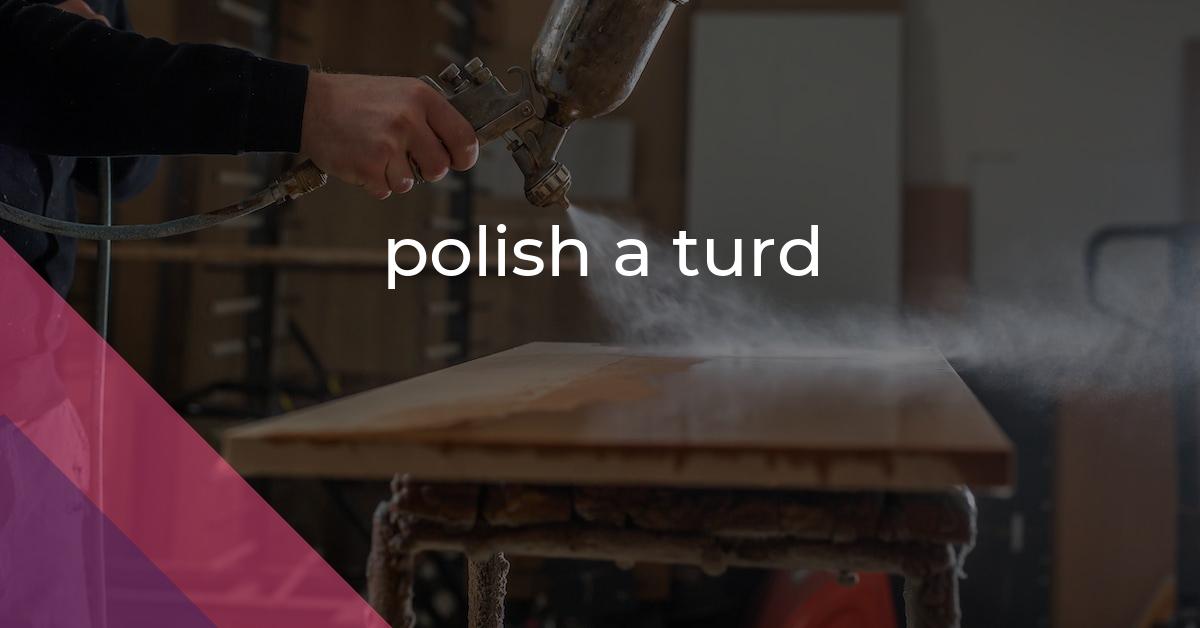polish a turd: Idiom Meaning and Origin
What does ‘polish a turd’ mean?
The idiom "polish a turd" is a colorful expression used to describe the futile act of trying to improve something that is inherently flawed or without value. It implies that no matter how much effort is put into polishing or enhancing it, the end result will still be unsatisfactory or worthless.

Idiom Explorer
The idiom "you can't polish a turd" means that it is impossible to make something bad or worthless look better or more impressive, no matter how much effort is put into it.
The idiom "screw the pooch" means to make a serious mistake or error. It is often used in informal settings and has a negative connotation. The origin of the idiom is unclear, but it is believed to have originated in the military.
The idiom "run into the ground" means to exhaust or use up completely, often through overuse or mismanagement.
The idiom "rub salt in the wound" means to worsen a difficult situation by adding insult or further distress to someone who is already suffering or upset.
The idiom *rough patch* refers to a difficult or challenging period of time in someone's life or a situation. It implies that things are not going well and there are obstacles or problems to overcome.
The idiom "rough around the edges" means that someone or something may appear imperfect or unrefined, but still has potential or qualities that make them interesting or valuable.
The idiom "rocking-horse shit" is a colorful way of describing something that is extremely rare or hard to find. It emphasizes the idea of something being as scarce as horse manure from a rocking horse, which doesn't exist in reality. The phrase is considered vulgar and used for comedic effect.
The idiom "reinvent the wheel" means to waste time and effort by attempting to create or do something that already exists or has been done before.
The idiom "read someone to filth" means to criticize or insult someone harshly and thoroughly.
The idiom "put on frills" means to add unnecessary or excessive decorative details or embellishments to something, typically to make it more attractive or impressive.
Surprising Illusion
The idiom "polish a turd" is a common expression in American English. It is often used to describe the futile attempt to improve something that is inherently unfixable or of low quality. This vivid phrase combines the verb "polish," meaning to make something shine or appear better, with the noun "turd," which refers to excrement. When used figuratively, the idiom suggests that no matter how much effort or skill is applied to a task, it cannot fundamentally change its intrinsic value.
The phrase "polish a turd" shares a similar sentiment with the idiom "you can't polish a turd". Both expressions convey the idea that some things are fundamentally flawed or undesirable, and no amount of effort can improve their nature. These idioms serve as a reminder that attempting to enhance or beautify something that is inherently unattractive is a futile endeavor. While the language used in these idioms may be humorous and slightly vulgar, they effectively convey a sense of disbelief, skepticism, or irony.
The idiom "polish a turd" has uncertain origins, but it is believed to have emerged in the English language during the 20th century. Its meaning arises from the stark contrast between the concept of refinement represented by "polish" and the base nature of excrement represented by "turd." This contrast emphasizes the futility of trying to make something inherently unappealing appear better. Despite its origins being unclear, the idiom has gained popularity in contemporary culture, commonly used in informal conversations, comedy circles, and online platforms.
Similar to the idiom "polish a turd," the expression "make a silk purse of a sow's ear" conveys the same concept of attempting to improve something that is inherently unimpressive. This idiom suggests that one is trying to transform or beautify something that is fundamentally unworthy of such efforts. While the language in both idioms may differ, they share the same underlying message of futility in trying to improve something that is inherently flawed or undesirable.
It is important to note that the idiom "polish a turd" is primarily used in informal and colloquial contexts. Its vivid imagery and strong language contribute to its memorable nature, making it a frequently employed phrase in casual speech. However, due to its slightly vulgar nature, it may not be appropriate to use in more formal or sensitive situations. Understanding the audience and context is crucial before employing this idiom.
The continued existence and usage of the idiom "polish a turd" highlight the versatility and richness of the English language. Despite its somewhat crude nature, the idiom serves as a reminder of the colorful and unexpected ways in which language can capture and convey complex ideas. Language evolves and adapts to suit the needs of its users, and idioms like "polish a turd" play a unique role in adding depth and nuance to our conversations.
Example usage
Examples of how the idiom *polish a turd* can be used in a sentence:
- Despite his efforts, Bob couldn't polish a turd and make his run-down car look presentable.
- The team spent hours trying to polish a turd by improving the faulty product, but their efforts were in vain.
- Trying to make an unsuccessful business deal sound appealing is like attempting to polish a turd.
More "Vulgar" idioms



